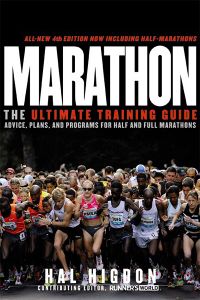Hal Higdon's Ultimate Training Guide
In many ways most of the Higdon plans define the traditional, 'vanilla' marathon training plan. Hal Higdon's book includes five different plans, plus there are additional plans freely available on halhigdon.com. You can also purchase more detailed versions of the plans online for between $20 and $40. (This article should be read in conjunction with my Comparison of Marathon Training Plans.)

| This review was made possible by readers like you buying products via my links. I buy all the products I review through normal retail channels, which allows me to create unbiased reviews free from the influence of reciprocity, or the need to keep vendors happy. It also ensures I don't get "reviewer specials" that are better than the retail versions.
|
- Key Characteristics
- Plans at many different levels with the option of buying a plan with extra tips and advice for each run.
- The easier plans have easy running midweek combined with a Long Run at the weekend.
- The more advanced plans use a marathon pace run one day, followed by a Long Run the next day, as well as some speedwork.
- Initial Ramp (mileage increase/week from start to 16): Rather steep at around 0.8 to 1.0.
- Core Ramp (mileage increase/week from 16 to max): Steep at around 1.0.
- Pros
- The web plans are free and you can purchase versions with extra tips for each run.
- The back to back MP + Long Run in the more advanced programs can be an effective training technique.
- Cons
- For the more advanced plans you have relatively longer runs back-to-back that requires you to commit time on both Saturday and Sunday, or have more freedom than most people during the week.
- The large number of plans can make it tricky to decide between them.
- Modifications
- For novice, intermediate 1, intermediate 2, and advanced 1, I would be inclined to drop one or two of the midweek easy runs, and possibly increase the length of the remaining midweek easy run.
- For advanced 2 I would be inclined to drop the two of the midweek easy runs and use the time for rest.
- I would change the cross training day into a rest day for all plans.
- Overtraining risk
- The risk of Overtraining is probably low for the novice plan as it has two rest days.
- The risk of Overtraining from the intermediate plans is moderate to high because of the back-to-back Long Runs. If you don't convert the cross training day to rest day, Overtraining risk is higher.
- The advanced plans have a moderate to high risk of Overtraining due to the lack of rest and the demanding back-to-back Long Runs.
- Good For::
- Beginner: 3. The novice plan is worth considering as it has a gradual buildup and the scope for a reasonable amount of rest.
- Novice: 3. One of the two intermediate plans may work well, but be cautious of the fatigue building up from the back-to-back Long Runs.
- Ringger: 2. While it may be worth a ringer considering one of the two intermediate plans, I believe that the Jack Daniels Plan A or FIRST would be a much better bet.
- Maintenance: 4. The intermediate one or possibly even the novice plan might work well for someone just looking to maintain their prior marathon fitness.
- Improver: 2. The intermediate or advanced plans could provide some significant improvement, but this has to be weighed up against the risk of Overtraining. With modifications to improve the recovery and rest time, I might bump this up to a 3 rating. I believe that the Jack Daniels Plan A or FIRST would be a much better bet
- Enthusiast: 2. The advanced plans look okay, but have enough Overtraining risk to make me cautious. I think that the Jack Daniels Plan A, or FIRST would be a better approach, or even the Jack Daniels Elite Plan or even Pfitzinger's Advanced Marathoning.
- Elite: 0. These plans lack the sophistication for a high level runner. I think that the Jack Daniels Elite Plan or even Pfitzinger's Advanced Marathoning would be better Also consider Jack Daniels Plan A or FIRST.
- Limited Training Time: 2. In terms of training time this is a middle-of-the-road plan.
- Traditionalist: 4. This is generally a fairly traditional pan, with the exception of the back-to-back Long Runs.
- Triathlete/Multisport: 2. The lower end plans include options for cross training, but these are probably better used as rest days.
- Prior Overtraining: 0. Most of these plans have a significant risk of Overtraining.
- Sub 3:00: 2. This plan adapts well to fast runners.
- 3:00-4:30: 3. This plan is probably a stretch for mid-pack runners.
- 4:30-5:30: 2. The novice, or possibly the intermediate-1, plans might work okay, but I think Galloway is a far better bet.
- 5:30+: 0. Use Galloway.
- Speedwork. There is no speed work in the lower plans, with a little in the advanced plans.
Template:Comparison of marathon training plans-suitability
